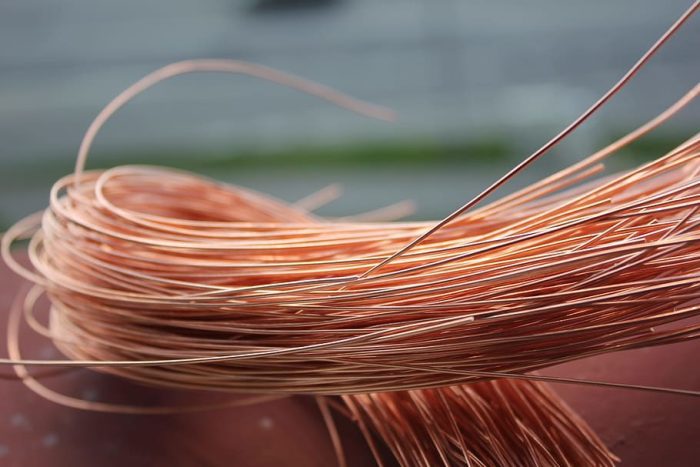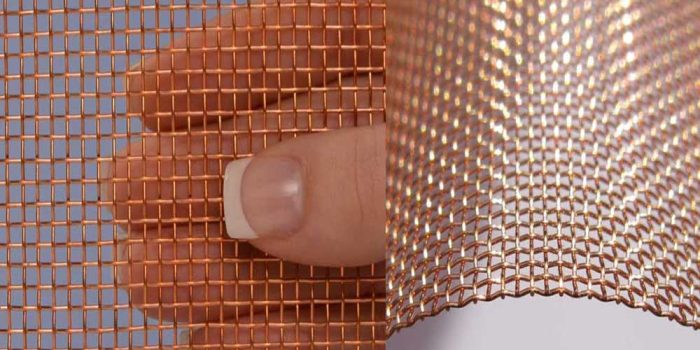Copper is a pure metal that is naturally occurring. The metal is also found as a mineral in the human system, offering various health benefits. You raise your copper levels when eating foods that contain it, like liver, oyster, nuts, etc.
Copper has high thermal conductivity and can be used in MRI machines, computers, and other devices and settings.
So, with so many uses of the element in both human health and machines, it raises the question, does copper protect from EMF? Let’s find out!

Does Copper Protect From EMF?
Copper is one of the most effective EMF-shielding metals due to its high thermal and electrical resistivity. This means it is a material that might strongly resist electrical current, so it does not absorb EMFs. Copper is often used in EMF-shielding products.
Copper Against EMF
Since copper is so good at attenuating magnetic and electrical waves, it is the most trustworthy metal for EMI shielding. Copper’s application in RFI shielding serves well for everything from hospital MRI machines to basic computer hardware.
This metal, along with its brass, phosphorous bronze, and beryllium copper alloy, is very versatile and simple to produce. But does copper protect from EMF? When it comes to absorbing and diffusing EMF radiation, copper is one of the metals that can be relied upon the most.
Its capacity to dampen magnetic and electrical waves is mostly to blame. This has various typical applications, including hospital MRI machines, computer hardware, server rooms, etc.
Radiation absorption
When it comes to EMF radiation absorption, copper is frequently utilized as a wire mesh since it blocks both radio and microwave radiation.
What matters is that the copper mesh’s holes are no larger than the radio or microwave waves it is trying to block, regardless of how thick the mesh may be. This is frequently built of aluminum foil and is known as a Faraday cage.
However, while metals like copper and aluminum are good EMF radiation shields, they do not absorb them. You are only shielded if a piece of metal is placed directly between you and the radiation source since these waves travel in a straight line.

How Copper Works to Protect Against EMFs?
The copper EMF protection products work to block or deflect the radiation’s penetration while also neutralizing electromagnetic waves and bolstering the body’s natural defenses.
Neutralization
When copper material neutralizes an EMF source, it replaces its dangerous positive ions with less dangerous negative ions. Exposure risk is decreased by neutralizing the EMF radiation coming from the source.
EMF absorption reduction
The amount of EMF radiation absorbed by your body is managed and regulated through an attenuation process. The best approach is reduction because using a Faraday cage or shield at home could be challenging.
A Faraday shield is a tool or technique that covers the conductive material to block electromagnetic waves. The distribution of electric charges within the conductive substance cancels the electromagnetic fields.
Faraday cage has a mesh that prevents other external radio frequency interference (RFI) devices from interfering with sending radio frequency signals.
Utilizing materials made of copper or other EMF-shielding materials such as aluminum, silver, or even shungite stone might aid in cutting down on EMF radiation.
Might boost your body’s natural defenses
By enhancing your body’s electromagnetic field, copper supports your defensive system. The body might thereby counteract the harmful effects of radiation from artificial technologies. Copper and other protective materials work to possibly boost your body’s natural resources.
Measuring Copper’s Effectiveness Against EMFs
A good EMF meter is crucial if you want to make your house safe and are interested in learning more about the quantity and kind of EMF radiation there. If you start using EMF shielding products made from copper, you will likely want to test their effectiveness.
Moreover, a good-quality EMF meter will help you measure its effectiveness. You can roam around your house or workplace using an EMF meter to determine how much EMF radiation is being released.
This is also very beneficial because you can gauge the effectiveness of any changes you make to lower the radiation. You can measure the EMF radiation levels before using the copper EMF shielding product and after to compare how much the emissions are lowered.
Other EMF Shielding Metals
Copper is not the only metal that might protect from EMFs, and as it is often used in medical and IT equipment, it is not the most affordable. Luckily, other metals might also help protect you if you cannot afford copper.
Pre-tin plated steel
Pre-tin plated steel is the ideal low-cost alternative that performs well from lower frequencies in the kHz range through frequencies into the lower GHz range. With a permeability value in the low hundreds, steel offers the low-frequency magnetic shielding feature lacking in alloy 770, copper, or aluminum.
In addition to providing a fantastic solderable surface for attaching the shield to the traces on the surface board during assembly, the tin coating gives corrosion protection for the steel to avoid rusting.
Galvanized steel and aluminum
Galvanized steel and aluminum are the most affordable and often used metals for shielding. Due to its non-ferrous qualities, high conductivity, and strength-to-weight ratio, aluminum is frequently used by people as a protection against EMFs.
Everyone can afford aluminum, and you likely have some aluminum foil in your home. Moreover, aluminum foil is an excellent material for a homemade Faraday cage.
Silver
Silicone-filled products used as gaskets and other electromagnetic shielding materials can contain metal particles made of silver, silver-copper, silver-aluminum, silver-glass, and nickel-graphite.
Many electronic gadgets, especially wireless ones, benefit from these particle-filled silicones’ performance, durability, and conductivity.
Conclusion
Does copper protect from EMF? According to the information above, the answer is definitely yes.
Copper is an excellent way to shield yourself from EMF radiation, which is why it is often found in medical and IT equipment. These are the two professions where people are most exposed to EMF radiation. So, consider using copper as EMF shielding material.
